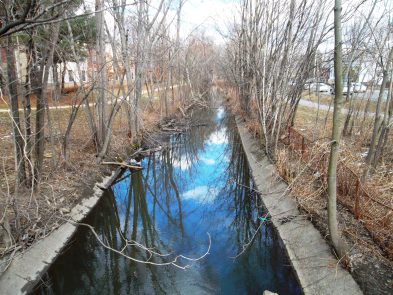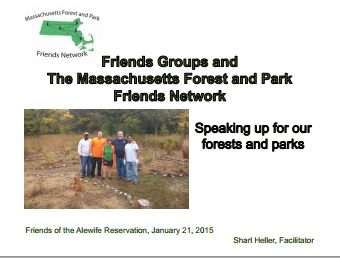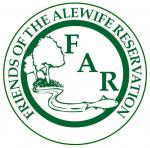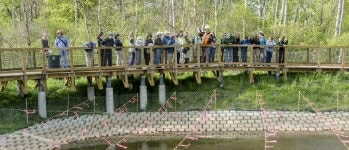Posted by Mystic River Watershed Association, January 27, 2014 at 02:34 PM
Many people associate Cambridge with the Charles River, which provides a gleaming, picturesque border with neighbor Boston. But about one-third of the city – in West and North Cambridge – is in the Mystic River Watershed, meaning water there drains into the Mystic, primarily via Alewife Brook.
This is also where important and innovative work is under way to correct a problem that dates to the late 1800s: ridding the landscape of combined sewer overflow (CSO) outfalls that impair water quality in the Alewife Subwatershed.
City Engineer Owen O’Riordan and Engineering Project Coordinator Catherine Woodbury of the Cambridge Department of Public Works gave a presentation on the city’s sewer separation project at the Mystic River Watershed Association’s Joint Committee Meeting on January 7.
Ideally, stormwater and sanitary sewer systems should function independently. But many older cities have combined systems that collect rainwater runoff, domestic sewage and industrial wastewater in the same pipe. Most of the time, these systems transport all of their wastewater to a sewage treatment plant, where it is treated and then discharged to a water body.
During big storms, however, the volume in a combined sewer system can exceed capacity. In such instances, combined sewer systems are designed to overflow, which discharges excess wastewater directly to nearby water bodies. These discharges help prevent sewage backups into homes, businesses and streets, but they impair water quality, often to dangerous levels.
In Cambridge, the city and the Massachusetts Water Resources Authority are collaborating on six projects to significantly reduce CSO discharges into Alewife Brook, including eliminating three of the eight original CSO outfall locations.
In addition, the amount of stormwater that enters the combined system is being reduced, which lessens the likelihood of combined outfalls. This is being accomplished in part by installing new storm drains in three neighborhoods, and by separating manholes that were common to the storm drain and sewer systems (effectively functioning as CSOs).
Several “green infrastructure” projects are part of the project, most notably the creation of a 3.5-acre wetland basin near the Alewife MBTA Station. The wetland, completed last October, collects the stormwater flows removed from the combined sewer system, and provides a level of natural water quality treatment before the water drains into the Little River and Alewife Brook. It also will reduce flooding, a long-time problem in the area, and improve the health of adjacent natural wetlands.
The marshy basin features 115,000 new wetland plants, 3,800 upland plants, paths and boardwalks, benches and bike racks, interpretive signs, overlooks, and a seating area designed for school group visits. Other techniques the city is implementing to reduce stormwater runoff include planting more than 400 street trees, building rain gardens, and replacing impervious pavement with porous pavement.
When the project is completed next year, officials expect the annual amount of untreated sewage released to Alewife Brook will be 85% below 1996 levels – dropping from 50 million gallons to 7.3 million gallons – with average annual CSO discharges falling from 63 to seven.
These initiatives will significantly improve the Alewife Subwatershed water quality, help restore the health of the Mystic River, and make the Alewife and Mystic River reservations safer and more inviting for recreation.
More information about the Cambridge sewer separation project is available on the city’s stormwater management web page.
The next Mystic River Watershed Association Joint Committee Meeting will take place at 7 p.m. on Tuesday, February 4, in the Rabb Room of the Lincoln Filene Center at Tufts University. At that meeting, the Massachusetts Water Resources Authority will give a presentation about its climate adaptation plans.
The public is welcome at all Joint Committee Meetings.
For more information on the Mystic River Watershed Association, visit www.mysticriver.org.

Alewife Brook
- Home
- Directions
- FAR Wildlife Blog
- Calendar
- News
- Donate Now
- Get Social!
- Storm Water Wetlands
- Plants and Restoration
- Photos
- Videos
- About & Projects
- Master Plan for Alewife
- Archive
- Newsletters
- Contact
 Presentation Spotlighting Alewife Reservation
Presentation Spotlighting Alewife Reservation
 Follow us on Twitter
Follow us on Twitter
 Like us on Facebook
Like us on Facebook
 Follow us on Instagram
Follow us on Instagram
Forward our web address to a friend!
- An Urban Gem - Alewife Reservation Nature Preserve
- Envisioning The Silver Maple Forest
- History and Policies of Cambridge, Belmont, and DEP
- Storm Water Wetlands
- Friends of Alewife Reservation brochure
(front, back) - Technical Analysis of Upper Alewife Basin
- Watershed: An Excursion in Four Parts
- The River Is A Restless Spirit: Life in the floodplain forest
-
Assessment of Silver Maple forest for DEP Adjudicatory hearings and
Patrick Fairbairn, author of the Assessment - Community Native Garden Flora
The
Alewife Reservation
is a unique natural resource for the communities of Belmont, Arlington and Cambridge
and home to hundreds of species, including hawks, coyotes beavers, snapping turtles, wild turkeys and muskrats,
the reservation is a unique natural resource for the community.
Historical information (Powerpoint)
Friends of Alewife Reservation works to protect and restore this wild area and the surrounding area for the water quality, native plants, animals and over 90 bird species with paths for walking, running and biking, recreation, and for classroom education and research. We regularly steward and preserve the Reservation area for wildlife and for the enjoyment of present and future generations.

(video)
By-Laws
About Friends of Alewife Reservation
Statement of Purpose
Citizen Forester newsletter archive
The Birds of the Cambridge Region of Massachusetts

by William Brewster 1906
Nuttal Ornithological Society
Biodiversity Study of Alewife Reservation Area: Species, Habitat, Ecosystems

Inventories by David Brown, wildlife assessor (2003, 2004.) Published by and available from FAR for $10. Write or call for your copy. (sample)
Updated Dave Brown Inventories (2008, 2010)
Inventories of Alewife Reservation Wetland Plants by Walter Kittredge, Botanist (2013)

